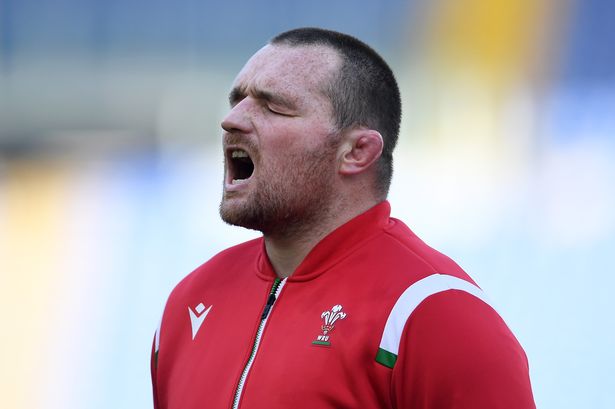[ad_1]
In the Sofa Six Nations of 2021 it is Wales who have made the rugby world sit up and take notice.
Before the tournament began, such was the horror show predicted it felt more advisable to view from behind the settee in the manner of a small child traumatised by a particularly disturbing 1970s episode of Doctor Who.
But we’ve been jumping on the cushions rather than peeping through them as Wales have bounced back to bid for their sixth Six Nations title of the 21st century.
Last year the only thing that felt more unimaginable than a table-topping team was that we would still be in lockdown in the middle of March this year. That dire Autumn Nations Cup campaign that saw Pivac’s men stutter and struggle in front of Parc y Scarlets’ silent stands left many supporters fearing the worst.
There was a sole prophet in the wilderness, however. On typically ebullient form, Scott Quinnell made a pre-tournament prediction that was met with incredulity across the land: “You talk about head and heart, they are the same thing for me,” he boomed on Scrum V.
“I’ve got to go for Wales. We’ve had bad years in the past and, OK, last year wasn’t great, but we’ve bounced back from bad years before with Grand Slams. That’s why, if we beat Ireland in this first game, we’re on a roll to a Grand Slam. You just wait and see.”
Quinnell’s fellow pundits on the show, Elinor Snowsill and Nathan Brew, smiled and eyed him from the studio sofa as if he’d been on the Green Room sherry. They plumped for more modest fourth-placed finishes for Wales.
But Mystic Scott was right. Wales did beat Ireland. A 14-man Ireland, granted. Lucky? No. Wales played by the same rules and didn’t transgress them. Ditto the Scotland game. It is not “luck” that gives the opposition of a red-carded team the advantage. Better discipline gives them the edge.
And Wales’ discipline has been a significant weapon in their armoury. They remain the only side yet to be a shown a card of any colour in the 2021 tournament. Indeed, they have now gone 15 games in the Six Nations without a sin-binning. This kind of control creates crucial margins in tight contests.
Then came England. Now Wales would be tested, scoffed their critics. Fifteen men to play against this time. By the end of a record 40-24 Welsh victory there were cries of 16 men as French referee Pascal Gauzere awarded those two controversial tries.
Yet those who, believe the ref “gifted” Wales 14 points in the first half, should remember England lost by 16. It was the reigning champions’ rank indiscipline which scuppered their chances of sealing the game when they drew level with Wales in the second half. Three consecutive penalties slotted by Callum Sheedy with the clinical calm so lacking in the opposition wrested control of the game back to Wales – and with it the Triple Crown.
In Rome, Wales combined that composure with creativity, clocking up more points against Italy than any other Six Nations team thus far and equalling their record tally of 17 tries in a tournament with one round to go.
And yet still the talk is of Wales contesting an undeserved Jam Slam. It is a given in the London press that any tournament decider without England involved is deemed a “non-vintage Six Nations”. But even by these standards, the Daily Telegraph’s headline this week – “Why Wales would be the ‘worst’ ever winners if they beat France” – was spectacularly graceless.
The idea that Wales would somehow be Grand Slam champions by default should they triumph in Paris tonight ignores a remarkable story of progress in a transitional year.
Imposing the Pivac playbook of more expansive rugby and adapting to a post-Shaun Edwards defence in the glare of a new tournament was never going to be easy. The absence of pivotal players like Ken Owens and Josh Navidi added to the coaching team’s challenges last autumn.
But in hindsight, this scenario offered the perfect opportunity to experiment. Eight new caps were blooded, new combinations were explored and understandably mistakes were made as the rebuilding process continued.
An impatient Welsh public – myself included – looked on with growing unease at a faltering set-piece and the inability to beat anyone except Italy and Georgia.
Four months on, the experienced cavalry have returned to add much-needed physicality – Wales have topped the successful tackles table with an average of 175 per game – while some of those fresh-faced foot soldiers have lit up the tournament. Callum Sheedy and Louis Rees-Zammit exude the positivity of a happy camp on and off the field.
Cap centurion George North has been revitalised by his shift to the midfield. Faletau is the living embodiment of “class is permanent”. And the lineout functions once more.
While our febrile fan psyche couldn’t cope with the lows of the Nations Cup, the squad itself kept faith. The coaching staff have resisted a full-blown “We told you so” but they have given a sense of their frustration at how Wales’ transition was perceived. As Jonathan Humphrys explained this week: “We kept on saying all the way through the autumn what the autumn was, but nobody wanted to listen. I understand international rugby, but we took that tournament to be something else.
“We said – we couldn’t have shouted it any louder – this is about building depth. You have got to take what comes with that.
“Everything else that goes along with it outside is irrelevant really. You can’t control what is said outside. But we had belief within us that when we came to the Six Nations and picked our best available team that we would be very competitive.”
Has that belief finally spread to the settee supporters? While not quite demonstrating the strut of the Goats of Llandudno there is optimism that Wales can go the whole hog in Paris. A quick survey of my Facebook friends’ punditry circle revealed that while French flair infused with the defensive steel of Shaun is indeed a formidable prospect, the Slam is on for a team who have won three of their last four away games to France.
Musician Geraint Cynan says: “I think we can edge it – we’ll just be clinical enough. The spine of Ken, Alun Wyn, Navidi, Tips, Faletau, Biggar, North, Davies and Liam is full of dog, experience and knowledge under pressure. Also the bench looks so much better these days. Virtually all through until the 2019 Rugby World Cup our bench looked thin. Now we have options.”
Journalist Rhys James also sees the Welsh finishers as crucial – as is parity up front: “Winning the set piece and putting pressure on France with our rolling mail is key. The French pack are huge but they were worn out by 60 minutes against England. Our bench has a big role to play.”
For actor Hywel Emrys it’s all about subduing France’s stellar scrum half: “We can do it. Tackle, tackle, tackle and hope our back row can deny Dupont quick ball.”
Hywel’s Pobol y Cwm pal Gwyn Elfyn agrees: “Our back row will be crucial. Defence needs to be faultless as the French are the most creative side in the competition. Hang in there and keep within touching distance.”
In touching distance of a Grand Slam only Scott Quinnell predicted, the scene is set for an edge of the seat finale to Wales’ Sofa Six Nations.
[ad_2]
Source link



